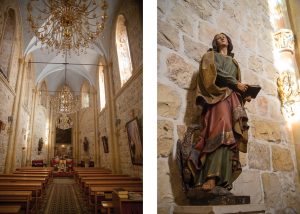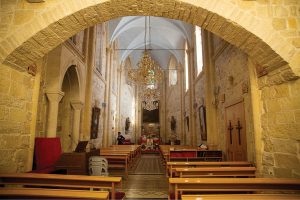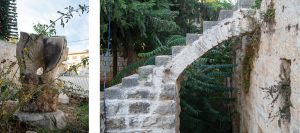By Bassam Almohor
In the middle of the valley to the north of Ramallah is a small evergreen, quiet, and peaceful village called Jifna. Its history goes back to a millennium before Christ when it was first mentioned in the Old Testament as “Ophni” and “Gophna,”* although the village was renamed Jifna, which means “the vines,” as it is known for its grapevines. Later on, Jifna appeared in the renown Madaba mosaic map as a town with two towers and a gate. Jifna is also mentioned in a tenth-century inscription on a stone above the gate of St. George’s Monastery in Wadi Qelt near Jericho.
Located 20 kilometers north of Jerusalem (31.962988, 35.215543) and 683 meters above sea level, the village of Jifna has been marked by the presence of Christians since the first centuries after Christ and holds countless stories. The village is home to 3,000 inhabitants, about 900 of whom are Catholic and Orthodox Christians, and the rest are Muslims. Both St. Joseph Catholic Church and St. George Orthodox Church were built in the mid-nineteenth century. In the middle of the town, there are the ruins of the ancient Byzantine St. George Church that was built in the sixth century.
One of the old stories the villagers retell even today is the story of the Holy Family and the village water spring in the middle of the town. The people of Jifna believe that the Virgin Mary with baby Jesus passed through the village on their way from Jerusalem, sitting down to rest near a spring under a fig tree. Branches still grow from that ancient tree, and a shrine in her name was built on the spot.
St. Joseph Catholic Parish was opened by the Latin Patriarchate in 1856 and houses a school where 113 students from kindergarten to sixth grade are enrolled. Like many Christian schools in Palestine, the patriarchate school welcomes both Christian and Muslim students.
The Crusaders built a large castle in the middle of the Christian urban center. It had a monumental gate with a portcullis and contained a large vaulted hall and thick walls of fine masonry. After their defeat by the Ayyubids under Saladin in 1187, the place fell into ruin. Nowadays, some renovations are being carried out on a small section to be used by the village youth club.
Jifna is famous for its lovely garden restaurants and swimming pools. People from all over visit the village to taste the delicious local meals and drinks. It is also known for its apricot harvest festival: each year, during the late spring period, hundreds travel to the village to harvest the fruit during its brief season.
For more information and guidance, contact the Latin parish priest Johny Bahbah at 059 824 0297.
Bassam Almohor can be reached at almohor@gmail.com, 059 753 4681, or through Facebook: @notebooktraveling.





